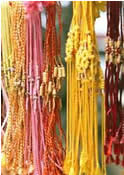 |
Rakhis |
The
sun radiates its sunlight, the radish spreads it seeds
I tie the rakhi on you, my brother, and wish you will live long.
In ancient India, it was customary to seek divine protection before starting any major enterprise—for example a long journey, business venture, battle or religious ritual. Protection sought at these times was for a limited time and for the specific task, and as a token of this, a sacred thread was tied on the hand of the person making the request.
There are several mythic accounts of the origin of this custom, one of which can be found in the Bhavishya Purana,* which tells of the battle between the demons and the gods. The gods, lead by Indra, were on the verge of defeat, when they approached Brihaspati, the god of prayer. Brihaspati suggested that Indra tie round his wrist a thread that had been charged with sacred mantras; it was Indra’s queen Indrani who empowered the thread and tied it on her husband.
Raksha
Bandhan (raskha, ‘protection’, bandhan,
‘to tie’) is a festival celebrated by both Hindus and Sikhs.
Although traditionally it was an occasion when sisters would wish divine
protection on their brothers—by bestowing upon them the wrist amulets
known as rakhis—nowadays the prayers have been extended
to include a wider definition of family. Not only will cousins and aunts
offer this protection to their sisterless kin, but in a wider humanitarian
gesture women will take rakhis to orphanages and prisons, an incredible
act of kindness that gives those without families and inmates cut off
from the world a feeling of being cared for, of belonging to a wider community.